Key takeaways:
- Nepotism creates barriers to fair competition and negatively impacts team morale and productivity.
- Establishing clear hiring and promotion policies, coupled with open communication, helps combat nepotism in the workplace.
- Fostering a supportive environment through mentorship and recognition can enhance collaboration and reduce the adverse effects of favoritism.
- Advocacy for transparency in decision-making and promoting allyship among colleagues is crucial for ensuring fair workplace practices.
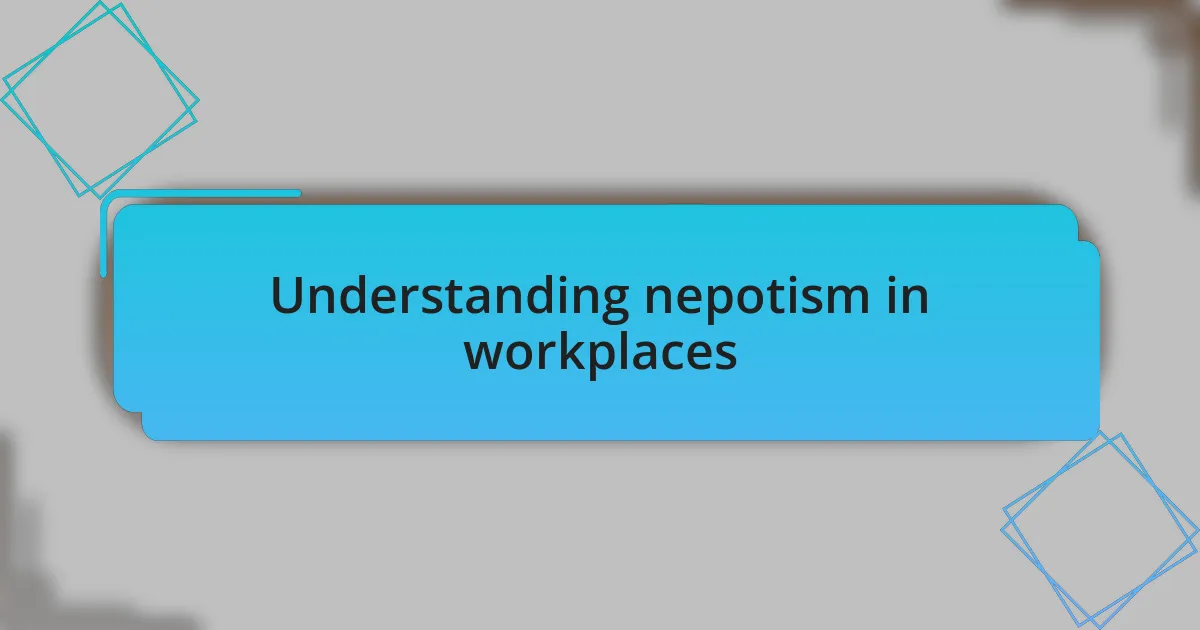
Understanding nepotism in workplaces
Nepotism in the workplace often manifests as favoritism towards relatives or friends, leading to disparities in hiring and promotion practices. I remember a colleague sharing her frustration after watching her less qualified coworker land a promotion solely because of their family connection to the higher-ups. This situation raises an essential question: how does favoritism compromise a team’s morale and performance?
In my experience, witnessing nepotism can feel like an invisible barrier blocking capable individuals from reaching their full potential. I once worked with a talented team member who was consistently overlooked, while the boss’s nephew received all the plum assignments. This imbalance not only hurt her professionally but also created a pervasive atmosphere of disillusionment and disengagement among the rest of us. It makes me wonder, what does this do to overall productivity and team cohesion?
Understanding nepotism requires us to consider its impact beyond individual cases, affecting the organization’s culture and integrity. When personal ties take precedence over merit, it raises critical questions about fairness and justice in the workplace. Can a company genuinely thrive when it ignores the principles of equal opportunity and transparency? From my perspective, the answer is a resounding no.
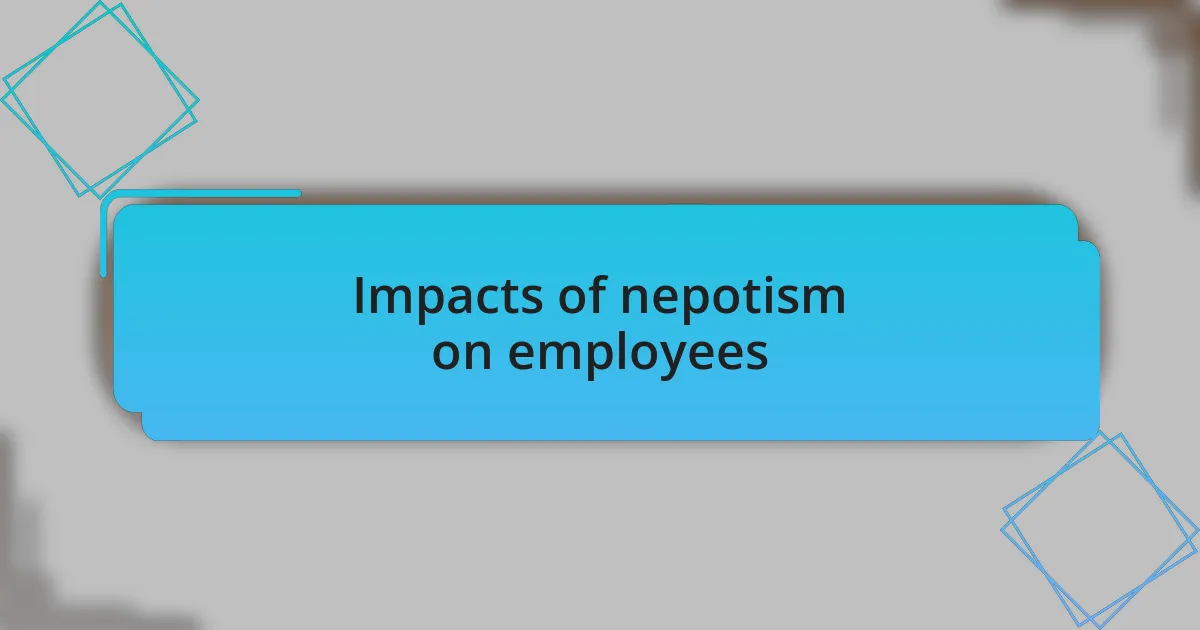
Impacts of nepotism on employees
The effects of nepotism on employees can be profoundly demoralizing. I recall a junior staff member who was exceptionally skilled yet constantly sidelined, watching as her efforts went unrecognized while the supervisor’s cousin received praise for mediocre work. This situation led to a palpable decline in her motivation and enthusiasm—who wouldn’t feel defeated in such an environment?
Moreover, the atmosphere of fear and mistrust such favoritism breeds can stifle collaboration. I remember a project where everyone was hesitant to share ideas, knowing that any innovative suggestion might just be overshadowed by the boss’s son, regardless of its merit. It made for a tense workspace, where creativity seemed to wither as we all held back, uncertain of our value.
In my observation, nepotism not only affects interpersonal relationships but also hampers overall organizational performance. When employees feel their hard work is overlooked in favor of family ties, it creates disillusionment that ripples throughout the team. Can a group truly excel when trust is eroded by such unfair practices? It’s a daunting question that many workplaces need to confront head-on.
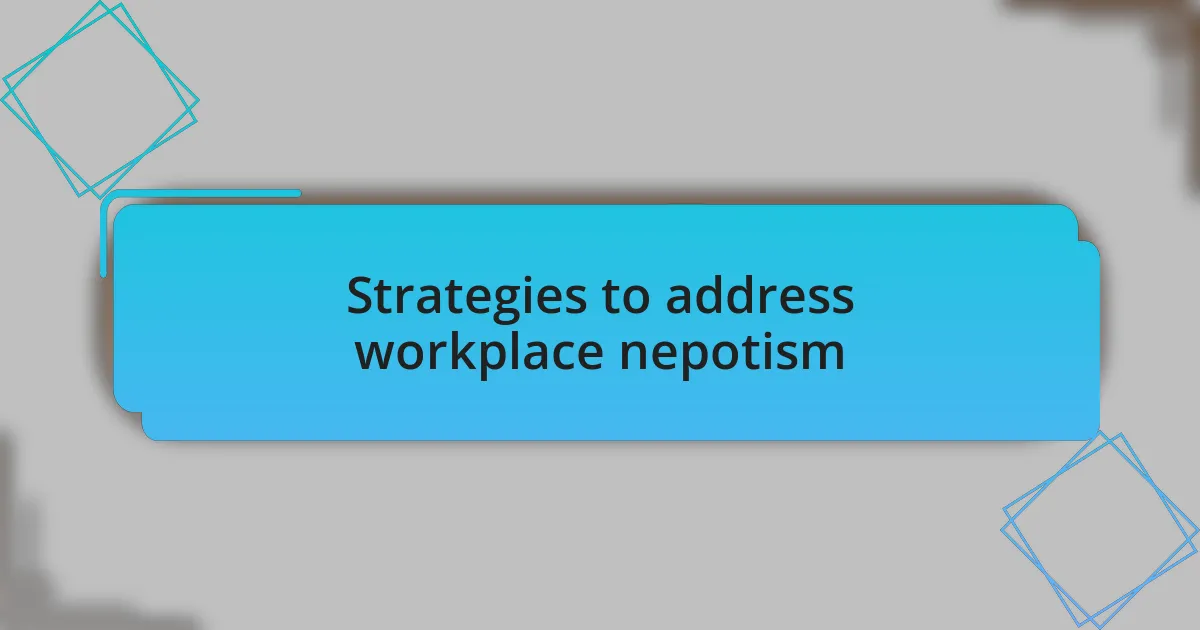
Strategies to address workplace nepotism
One effective strategy to combat nepotism is establishing clear policies regarding hiring and promotions. I remember when our company finally introduced a structured hiring system that emphasized merit over relationships. Suddenly, candidates were evaluated based on their qualifications and potential rather than connections, leading to a more diverse and capable team. Isn’t it refreshing to see talent recognized?
Another approach is fostering open communication among employees about their concerns. There was a time when I voiced frustrations about favoritism during a team meeting, and it sparked an important conversation. It turned out that many colleagues felt similarly but were afraid to speak up. Creating an environment where people feel safe sharing their experiences can invigorate dialogue around fairness, helping management recognize the need to address nepotism directly.
Additionally, promoting transparency in decision-making processes can deter nepotism effectively. I’ve witnessed how regular updates on project progression and evaluation metrics keep everyone informed and accountable. When employees understand how decisions are made and see consistent standards applied, it can rebalance the scales of justice in the workplace. Isn’t accountability at every level the key to restoring trust in our roles?
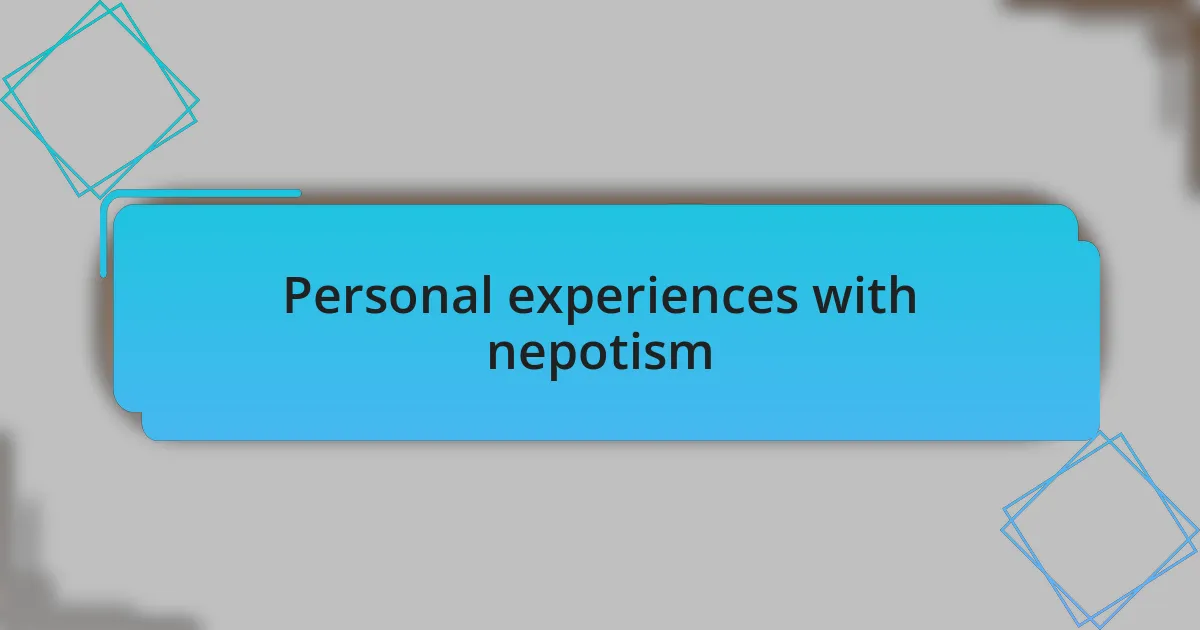
Personal experiences with nepotism
In my early career, I experienced the sting of nepotism firsthand when a colleague, whose uncle was in a senior position, received a promotion I had been vying for. It felt disheartening to see someone less qualified leap ahead, seemingly based on their connections rather than their performance. Have you ever felt that sense of unfairness creeping in when you know you’ve put in the hard work but still didn’t get recognized?
I recall a specific project where my team was exceptionally talented, yet our manager consistently favored his niece, whose contributions were minimal at best. It was frustrating to watch her receive credit and opportunities that we all had earned together. This favoritism not only lowered morale but also created an uncomfortable tension in the team. How can genuine collaboration thrive when favoritism undermines it?
Eventually, I found my voice and shared my experiences with others, realizing I wasn’t alone. Talking openly about the challenges we faced helped knit a stronger bond among us. It was a relief to unearth that solidarity and collectively confront the issue, leading to more discussions around fairness and equity. Have you ever experienced that moment of clarity when sharing your struggles turns into a powerful catalyst for change?
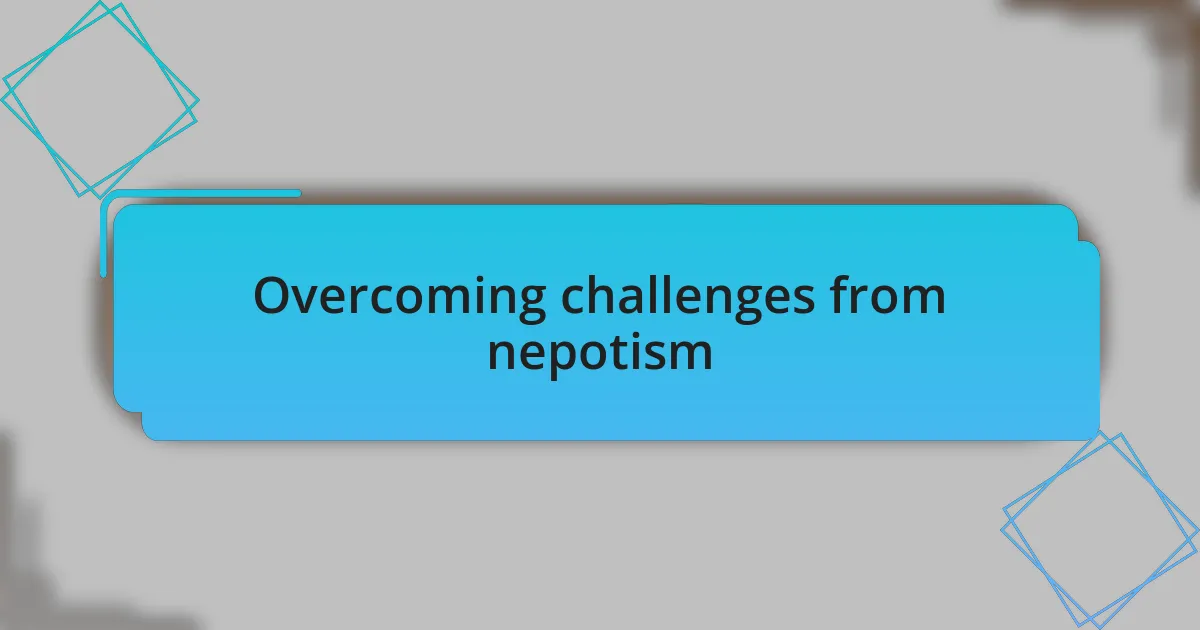
Overcoming challenges from nepotism
One of the most effective strategies I found for overcoming nepotism was to focus on my own professional development. Instead of dwelling on what I couldn’t control, I dedicated time to enhancing my skills through workshops and mentorship. Have you ever considered how personal growth can sometimes divert your attention from the frustrating circumstances around you? It became clear to me that the best way to rise above favoritism was through continuous improvement.
I also started leveraging my network more actively. Instead of seeing nepotism as a barrier, I reached out to others within my field for insights and opportunities that existed outside my immediate environment. I remember a conversation I had with a colleague from another department who had faced similar hurdles. Was it really surprising to learn that building these connections could open doors I didn’t even know were there? That exchange sparked new opportunities that ultimately led to a promotion based solely on merit.
Moreover, sometimes it takes a collective push to create a culture of accountability. By initiating regular team meetings to discuss our goals and achievements, we slowly shifted the focus back to performance rather than connections. I learned that simply sharing our successes inspired others to recognize and appreciate the team’s efforts rather than falling back on favoritism. Have you ever noticed how a simple change in perspective can bring a team closer together? In my case, it truly transformed the dynamics and fostered a healthier work environment.
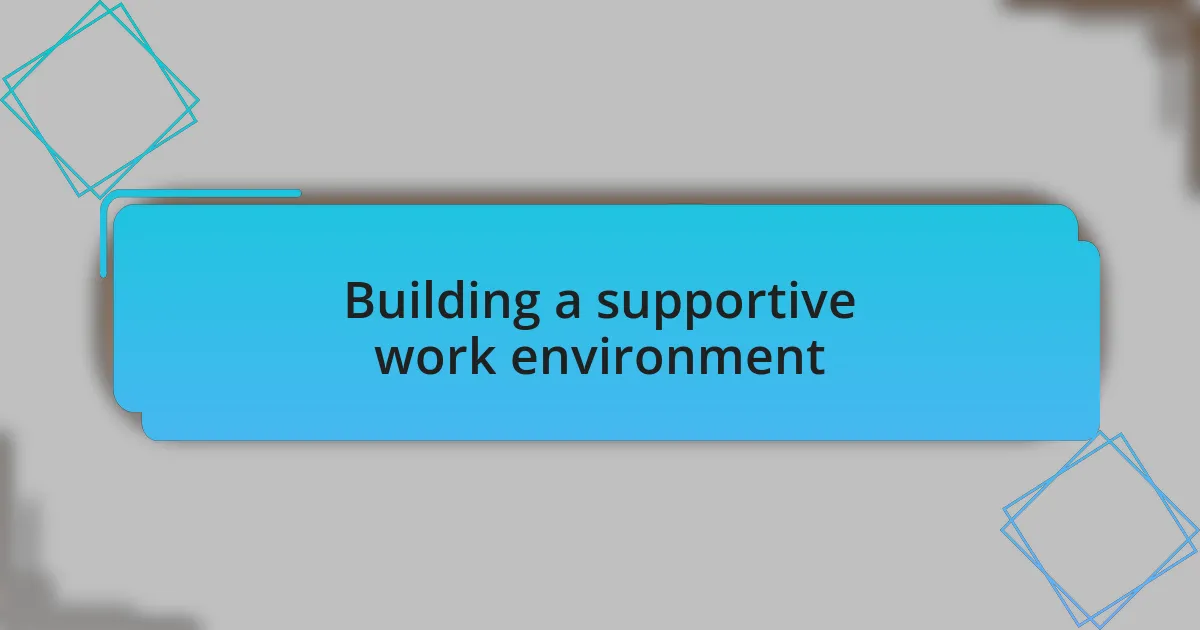
Building a supportive work environment
Creating a supportive work environment is essential, especially when navigating the complexities of nepotism. I recall a time when I volunteered to lead a team-building retreat. It was a chance for colleagues to share their experiences and bond over common challenges. How often do we overlook the power of shared stories? That day, I witnessed firsthand how open dialogue fostered trust and camaraderie, allowing us to support each other despite the political pressures we faced.
Additionally, I found that leading by example made a difference. When I actively recognized and celebrated my peers’ contributions, it encouraged a culture of appreciation and teamwork. I remember a situation where I highlighted a teammate’s project during a staff meeting, and their gratitude was palpable. Have you ever seen how acknowledging someone else’s hard work can shift the mood of an entire team? It reinforces a sense of belonging, making everyone feel valued and less intimidated by the looming presence of favoritism.
Moreover, I’ve learned the importance of mentorship in cultivating a nurturing atmosphere. I took the initiative to connect with junior employees, offering guidance and sharing my experiences. Watching their confidence grow reminded me of my own journey. Isn’t it incredible how empowering others can simultaneously uplift you? By extending support, we dismantled the hierarchical barriers that often come with nepotism, fostering a sense of unity and shared purpose.
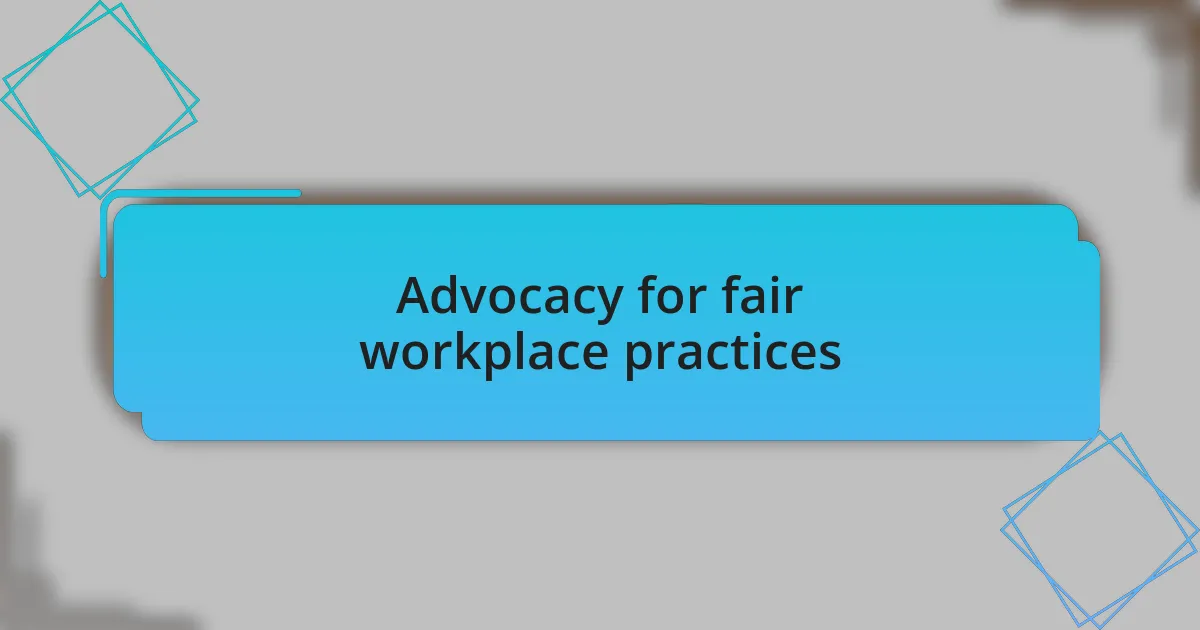
Advocacy for fair workplace practices
Advocacy for fair workplace practices starts with a commitment to transparency. I clearly remember a time when our team decided to implement anonymous feedback sessions on policy changes. The results were eye-opening. It encouraged everyone, including those who felt voiceless, to express their thoughts without fear. Isn’t it refreshing to think that honest input can truly shape the workplace environment?
Equally important is establishing clear guidelines for promotions and hiring processes. During a project, I noticed colleagues feeling uncertain about career advancement. To address this, we collaborated on creating a transparent evaluation criteria document that laid out expectations and qualifications. Once implemented, I saw how it created a buzz of excitement among my peers. Have you ever felt the thrill of knowing you could genuinely compete based on merit rather than connections?
Lastly, I believe in the power of allyship. I recall standing beside a coworker who faced dismissal of their ideas due to a lack of family ties in our organization. By vocalizing my support and championing their proposal, we not only saw it approved but also transformed the conversation about contribution value in our meetings. Wouldn’t it be amazing if we all took a stand for one another? Supporting our colleagues against favoritism not only enhances our team dynamics but also paves the way for equitable opportunities for everyone.